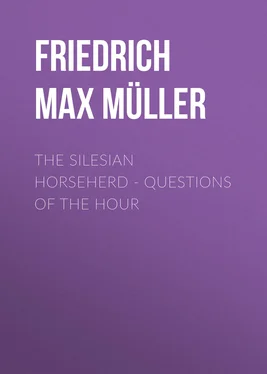Friedrich Max Müller - The Silesian Horseherd. Questions of the Hour
Здесь есть возможность читать онлайн «Friedrich Max Müller - The Silesian Horseherd. Questions of the Hour» — ознакомительный отрывок электронной книги совершенно бесплатно, а после прочтения отрывка купить полную версию. В некоторых случаях можно слушать аудио, скачать через торрент в формате fb2 и присутствует краткое содержание. Жанр: foreign_prose, foreign_religion, Философия, foreign_psychology, foreign_antique, на английском языке. Описание произведения, (предисловие) а так же отзывы посетителей доступны на портале библиотеки ЛибКат.
- Название:The Silesian Horseherd. Questions of the Hour
- Автор:
- Жанр:
- Год:неизвестен
- ISBN:нет данных
- Рейтинг книги:4 / 5. Голосов: 1
-
Избранное:Добавить в избранное
- Отзывы:
-
Ваша оценка:
- 80
- 1
- 2
- 3
- 4
- 5
The Silesian Horseherd. Questions of the Hour: краткое содержание, описание и аннотация
Предлагаем к чтению аннотацию, описание, краткое содержание или предисловие (зависит от того, что написал сам автор книги «The Silesian Horseherd. Questions of the Hour»). Если вы не нашли необходимую информацию о книге — напишите в комментариях, мы постараемся отыскать её.
The Silesian Horseherd. Questions of the Hour — читать онлайн ознакомительный отрывок
Ниже представлен текст книги, разбитый по страницам. Система сохранения места последней прочитанной страницы, позволяет с удобством читать онлайн бесплатно книгу «The Silesian Horseherd. Questions of the Hour», без необходимости каждый раз заново искать на чём Вы остановились. Поставьте закладку, и сможете в любой момент перейти на страницу, на которой закончили чтение.
Интервал:
Закладка:
But second, the conception that the Logos was born in Jesus might simply signify the same as Philo means, when he speaks of the Logos in Abraham and in the prophets. This would be intelligible from Philo's point of view in relation to Abraham, but clearly does not go far enough to explain the deification of Christ as we find it in all the Evangelists.
There remains possible therefore only a third conception. Philo knows very well that God has an infinite number of powers or ideas, all of which might be called Logoi, and together constitute the Logos. If now, among these Logoi, that of humanity were conceived as highest, and Jesus were regarded as the incarnate Logos, as the expressed and perfectly realised idea of man, all would be intelligible. Jesus would then be the ideal man, the one among mortals who had fully realised the idea of man as it existed in God, who on the one side was the son of God, on the other side the son of man, the brother of all men, if they would only acknowledge Christ as the Son of God, and emulate His example. This would be a correct and to us a perfectly intelligible and acceptable conception. But many as are the difficulties which this would remove, the objection remains that we can produce no historical proof of such a conception of Jesus as Logos of humanity. We are too poor in historical monuments of the first three Christian centuries to be able to speak with assurance of the inner processes of thought of even the most prominent personalities of that time. In everything, even in relation to many of the leading questions of the Christian religion, we are obliged to rely on combination and construction. Not only in the Evangelists, but in many of the church fathers, feeling overcomes reason, and their expressions admit but too often of the most varied interpretations, as the later history of the church has only too clearly proved. Nevertheless we must endeavour to enter not only into their emotions, but also into their thoughts, and not believe that they used words without thoughts. I do not say that this is impossible. Unthinkable as it is, that words arise and exist without ideas, yet we know only too well that words become mere words, that they grow pale and die, and that they may finally become vox et prœterea nihil . It is, however, the duty of the historian and especially of the philologist to call back to life such words as have given up the ghost. May what I have here written about the meaning of the Logos fulfil this aim, and at the same time make it clear that my desire for the discovery of the original text of the Sermo Verus was not an idle one. I have since learned that the same wish was expressed at an earlier date by no less a person than Barthold Niebuhr.
Chapter II.
The Pferdebürla (Horseherd)
A contributor to a periodical, which, like the Deutsche Rundschau , has a world-wide circulation, receives many letters from every corner of the earth. Many of them are nothing more than the twitter of birds in the trees; he listens and goes his way. Others contain now and then something of use, for which he is thankful, usually of course in silence, for a day and night together contain only twenty-four hours, and but little time remains for correspondence. It is interesting to note how radically one is often misunderstood. While one person anonymously accuses the writer of free thinking and heresy, another, and he generally gives his name, complains of his orthodox narrow-mindedness, hypocrisy, and blindness, which for the most part are attributed to poor Oxford, which, in foreign countries at least, still has the reputation of high church orthodoxy.
Yet, in spite of all this, such letters are useful, for they give us a knowledge of the public which we desire to influence, but which for the most part goes its own way, as it may find most convenient. Often such opinions come to us from the highest circles, at times also from the lowest, and it is difficult to tell which of the two are the more instructive. The problems of humanity in all their simplicity are after all the same for us all, only they are viewed from different standpoints, and are treated with scientific or practical design. Members of the same profession readily understand each other; they employ their own technical language; but the unprofessional person often goes straighter to the heart of a question, and refuses to be satisfied with authorities or traditional formulas. These gentlemen it is often difficult to silence. We can easily contend with combatants who wield their weapons according to the rules laid down by the schools; we know what to expect, and how to parry a quart or a tierce. But an opponent who strikes regardless of all rule is often hard to manage, and we get a scar where it is least expected or deserved. In this wise I was served by an unknown opponent, who wrote to me from a place in the neighbourhood of Pittsburgh, not far from Ohio. He had read in his country solitude my article on Celsus in the Deutsche Rundschau . I know nothing of him, except what he himself writes, but the man interested me. After all, he says in his rude way very much the same things as others veil in learned phrases, and his doubts and difficulties are manifestly products of his heart as well as of his brain. The problems of humanity have troubled him with genuine pain, and after honestly thinking them out as well as he knew how, his convictions stand firm as a rock, and all who disagree with him seem to him not only fools, but unfortunately hypocrites as well. It is the misfortune of these lonely thinkers that they cannot comprehend how any one can hold opinions differing from their own without being dishonest. They cannot doubt that they have been honest toward themselves, and as a consequence they cannot conceive how others, who are of a different mind, can be equally honest, and have come by their convictions by a straightforward path. Often it has been very difficult for them to break with their old faith, cherished from childhood, and they can only look upon it as cowardice and weakness if others, as they think, have not made or wished to make this sacrifice. But we shall let the horseherd who emigrated to America speak for himself.
I here print his letter exactly as I received it, without any alterations. 34 34 The original was, however, in German.
To me it seems that the man speaks not only for himself, but for many who think as he does, but who have not the ability nor the opportunity to express themselves clearly. I resolved, accordingly, to reply to him, and once begun, my pen ran on, and my letter unexpectedly covered more ground than I had intended. Whether he received the letter or not, I do not know; at least it must have been delivered to his address, for it was not returned to me. As I have not, however, heard from him again since February, and as he speaks in his letter of chest catarrh, which he hopes will in no long time bring him to a joyful end, I must wait no longer for an answer, and publish the correspondence in the hope that there are other “Pferdebürle” in the world to whom it may be of value.
Pittsburgh, Pa., U.S., February 26, 1896.
Dear Colleague Max Müller:
“Your article in the Deutsche Rundschau on Celsus pleased me very much. What does it matter that you do not know me? I love you, and that gives me a right to address you. Why those vain regrets over the loss of the original? I would not stretch out my little finger for that Celsus; gone is gone like the lost parts of the Annals of Tacitus. More than likely both of these losses are to be ascribed to Christian fanaticism. Tacitus hated the Jews and the Christian sect derived from them. But, father Max, have we not much greater modern Celsuses and Tacituses, for instance David Hume and Schopenhauer? One would think that after the writings of these heroes positive Christianity would be an impossibility, and yet the persistence of error is so great that it may take several centuries more before the end of the Christian era is reached. Has there ever been anything in the history of the world more humiliating to the human understanding than this false and lying tale of the Christian religion? And is there anything in face of our knowledge, and of the realm of nature and of man's position in it, so unbearable, yes so odious, as the inoculation of such error in the tender consciousness of our school children? I shudder when I think that in thousands of our churches and schools this systematic ruin of the greatest of all gifts, the consciousness, the human brain, is daily, even hourly, going on. Max, can you, too, still cling to the God-fable? The English atmosphere may serve as an apology. I could not strike a dog, but I am filled with bloodthirstiness toward the Jewish idea of God, the soul-phantom, and the hallucination of immortality.—The facts are so simple and clear; we are the highest existing forms of being in the animal world of this planet, and share one and the same nature with them. After death we are just as entirely reduced to nothing as before our birth. Nature tells us so plainly that the eternal conditions before and after our birth are identical.
Читать дальшеИнтервал:
Закладка:
Похожие книги на «The Silesian Horseherd. Questions of the Hour»
Представляем Вашему вниманию похожие книги на «The Silesian Horseherd. Questions of the Hour» списком для выбора. Мы отобрали схожую по названию и смыслу литературу в надежде предоставить читателям больше вариантов отыскать новые, интересные, ещё непрочитанные произведения.
Обсуждение, отзывы о книге «The Silesian Horseherd. Questions of the Hour» и просто собственные мнения читателей. Оставьте ваши комментарии, напишите, что Вы думаете о произведении, его смысле или главных героях. Укажите что конкретно понравилось, а что нет, и почему Вы так считаете.












